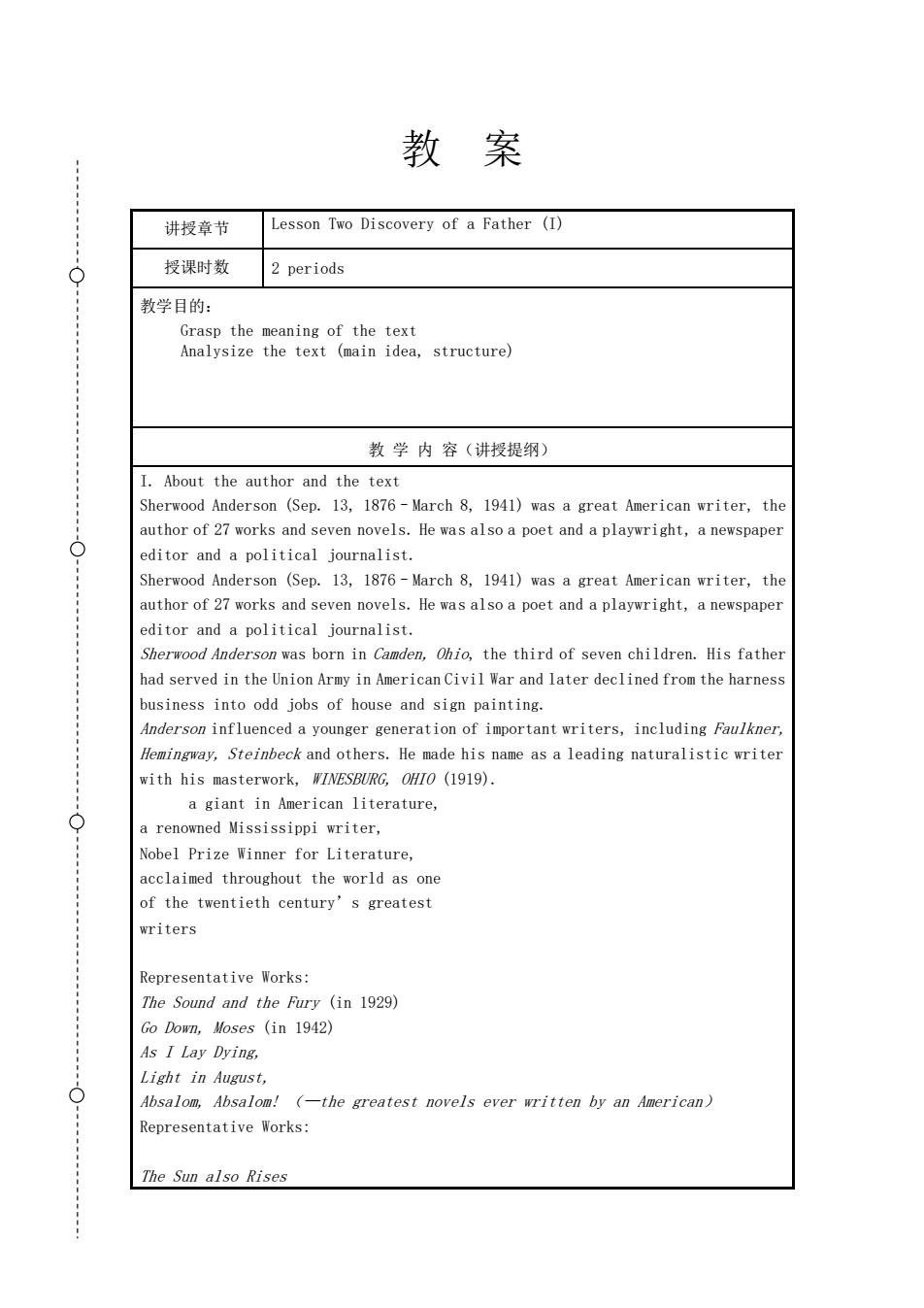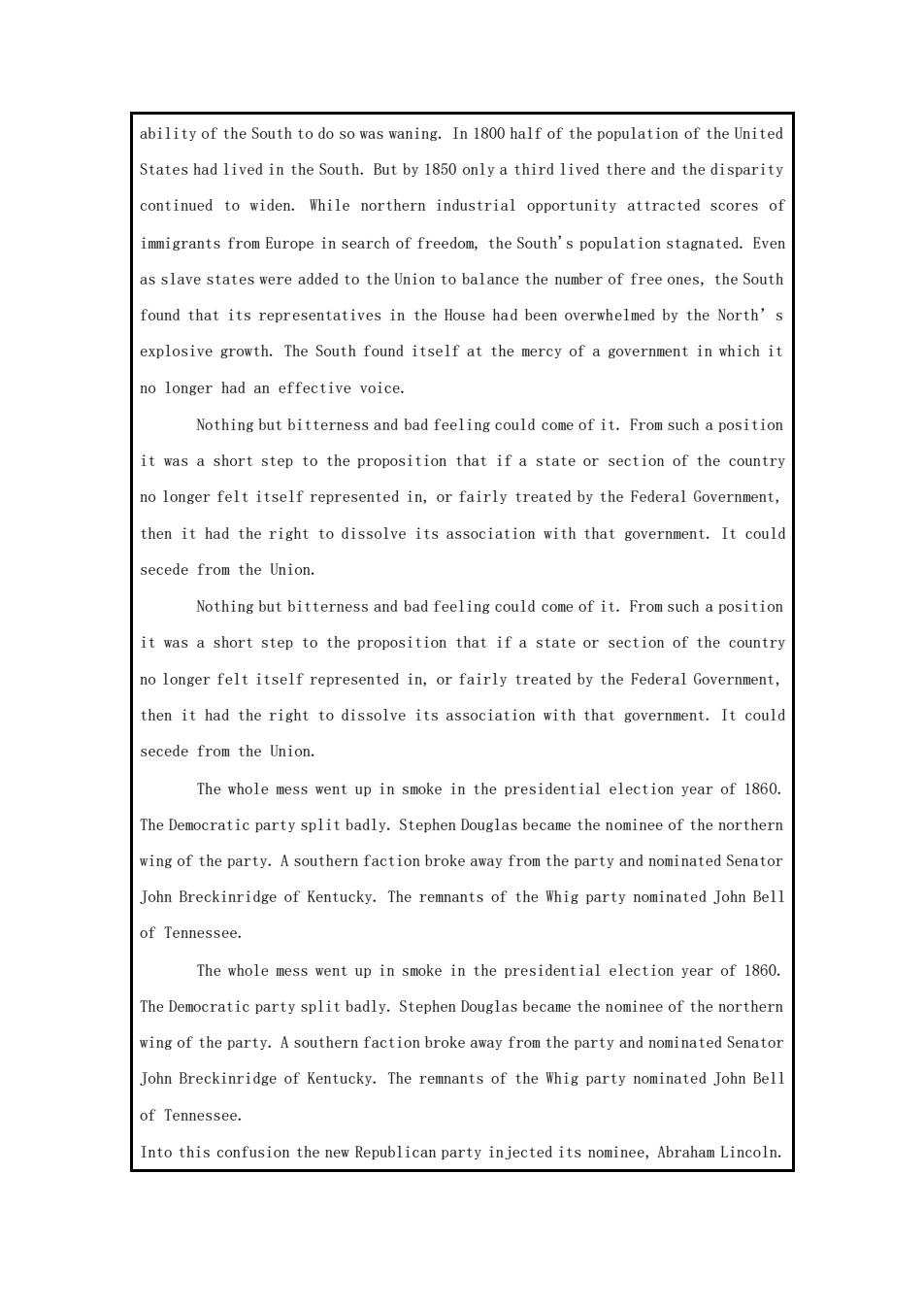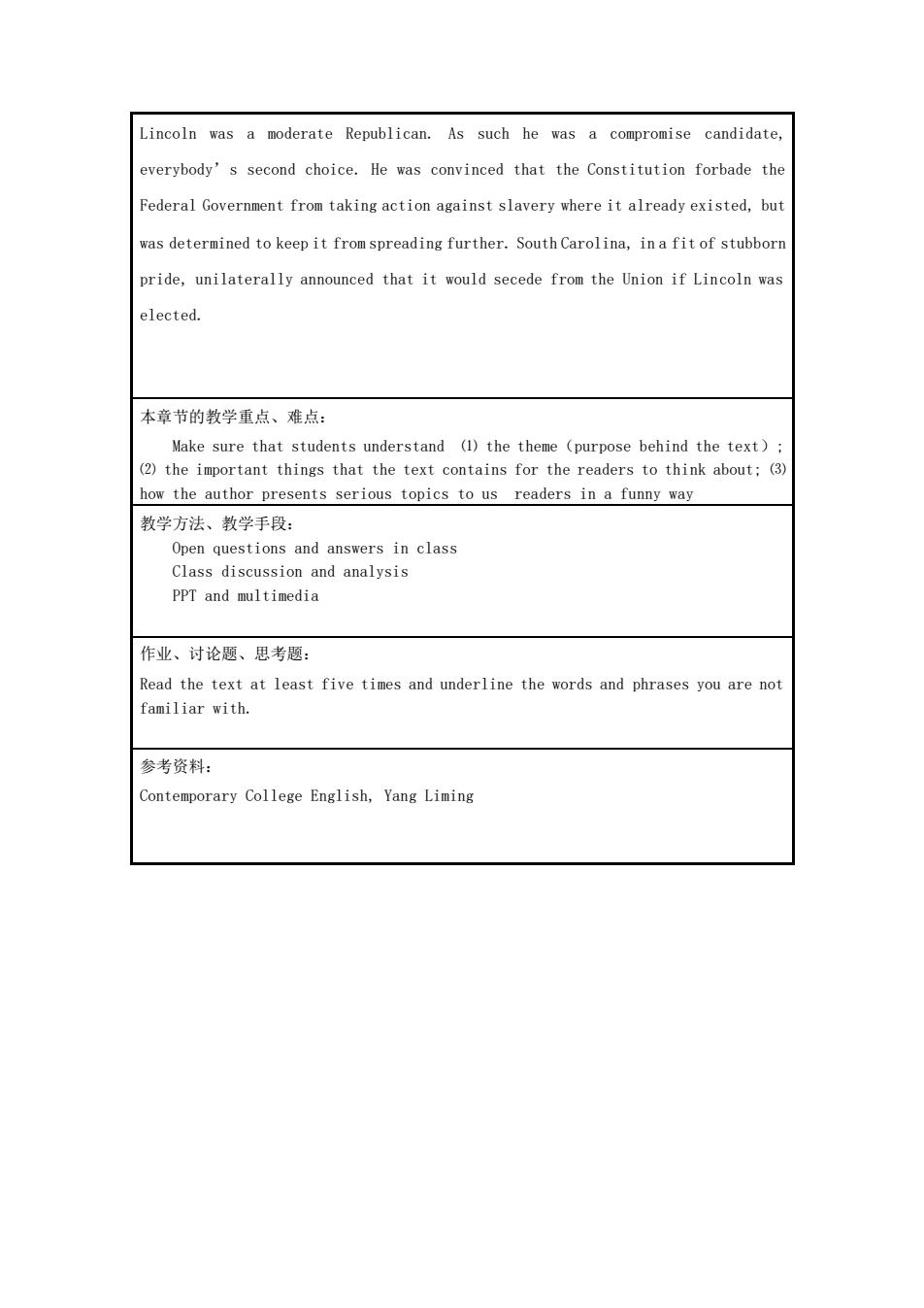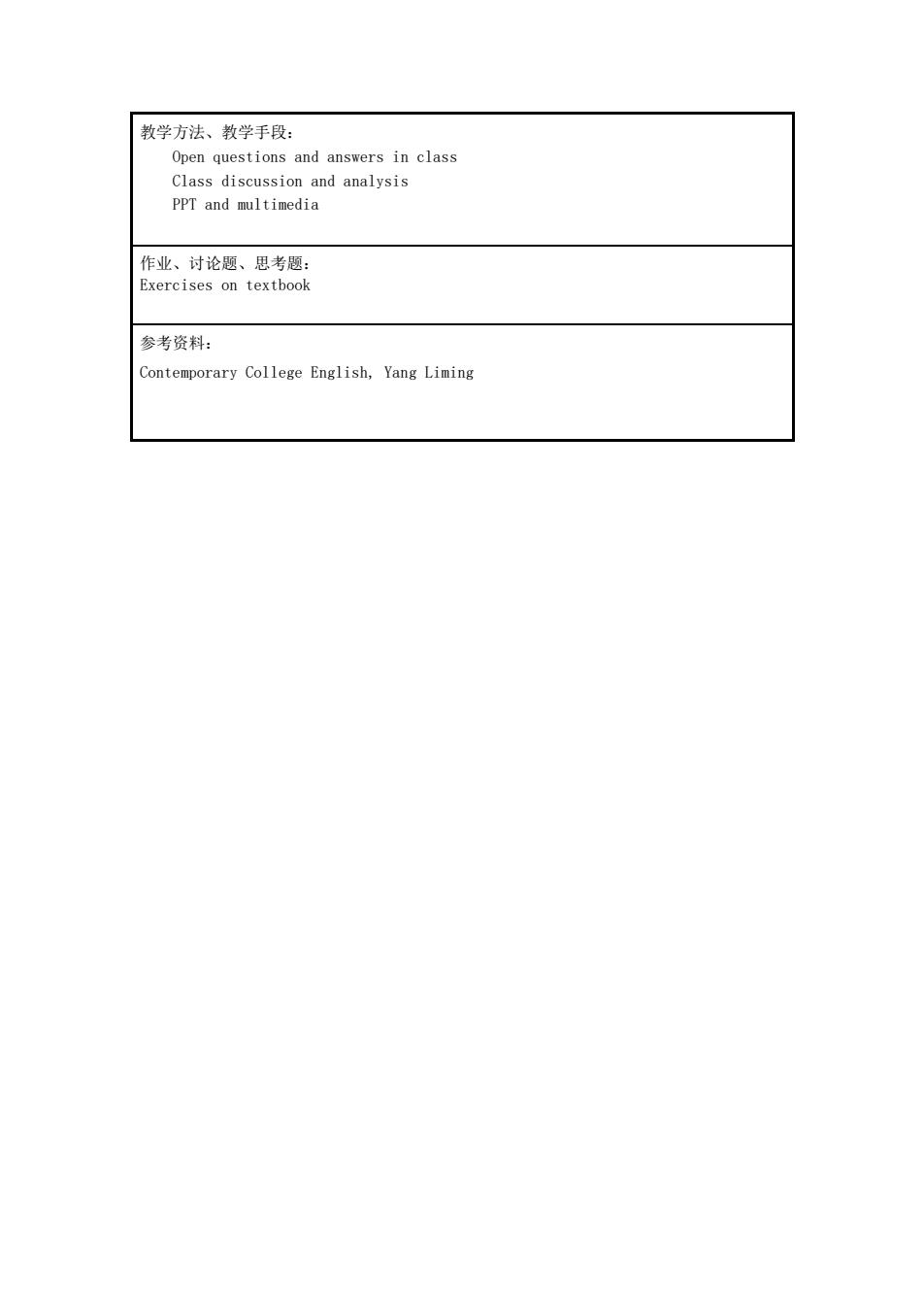
吉林大学珠海学院 教案 2011~2012学年第2学期 系(中心)外语系 教研室英语专业 课程名称英语精读(四) 主讲教师 吉林大学珠海学院教务处制
吉林大学珠海学院 教 案 2011~2012 学年第 2 学期 系(中 心) 外语系 教 研 室 英语专业 课 程 名 称 英语精读(四) 主 讲 教 师 _ 吉林大学珠海学院教务处制

教案 讲授章节Lesson Two Discovery of a Father(① 授课时数 2 periods 教学目的: 教学内容(讲授提纲 I.About the author and the text son (Sep.13,1876-March 8,1941)was a great American writer,the author of 27 works and seven novels.He was also a poet and a playwright,a newspaper editor and a political journalist. Sherwood Anderson (Sep.13,1876-March 8,1941)was a great American writer,the author of 27 orks and seven novels.He wasalso a poet and a playwright,a newspape editor and a political journalist. Sherwood Anderson was born in Camden.Ohio,the third of seven children.His father had served in the Union army in American Civil war and later declined from the harnes business into odd jobs of house and sign painting Anderson influenced a younger generation of important writers,including Faulkner Memingway,Steinbeck and others.He made his name as a leading naturalistic writer with his masterwork.INESBURG.OH/O (1919). a giant in American literature, a renowned Mississippi riter, Nobel Prize Winner for Literature, acclaimed throughout the world as one of the twentieth century's greatest writers Representative Works: The Sound and the Fury (in 1929) Go Down,Moses (in 1942) As I Lay Dying. Light in August, Absalom,Absalom!(-the greatest novels ever written by an American) Representative Works The Sun also Rises
教 案 讲授章节 Lesson Two Discovery of a Father (I) 授课时数 2 periods 教学目的: Grasp the meaning of the text Analysize the text (main idea, structure) 教 学 内 容(讲授提纲) I. About the author and the text Sherwood Anderson (Sep. 13, 1876–March 8, 1941) was a great American writer, the author of 27 works and seven novels. He was also a poet and a playwright, a newspaper editor and a political journalist. Sherwood Anderson (Sep. 13, 1876–March 8, 1941) was a great American writer, the author of 27 works and seven novels. He was also a poet and a playwright, a newspaper editor and a political journalist. Sherwood Anderson was born in Camden, Ohio, the third of seven children. His father had served in the Union Army in American Civil War and later declined from the harness business into odd jobs of house and sign painting. Anderson influenced a younger generation of important writers, including Faulkner, Hemingway, Steinbeck and others. He made his name as a leading naturalistic writer with his masterwork, WINESBURG, OHIO (1919). a giant in American literature, a renowned Mississippi writer, Nobel Prize Winner for Literature, acclaimed throughout the world as one of the twentieth century’s greatest writers Representative Works: The Sound and the Fury (in 1929) Go Down, Moses (in 1942) As I Lay Dying, Light in August, Absalom, Absalom! (—the greatest novels ever written by an American) Representative Works: The Sun also Rises

Farewell to Arms The Old Man and the Sea For Whom the Bell Tolls American novelist,story writer, playwright,and essayist, Nobel Prize Winner for Literature in 1962,best remembered for The Grapes of Wrath (1939),a novel widely considered to be a 20th-century classic Other Works: Of Mice and Men (1937) The Moon is Down (1942) The Pearl (1947) II.Background The American Civil War (1861-1865)was the greatest war and the only war fought on American soil.3,000.000 people fought-600,000 people died.It brought an end to the constitution of slavery and paved the way for the capitalist development in America The Civil War was caused by a myriad of conflicting pressures,principles, and prejudices,fueled by sectional differences and pride,and set into motion by most unlikely set of political events At the root of all of the problems was the institution of slavery.The American Revolution had been fought to validate the idea that all men were created equal, yet slavery was legal in all of the thirteen colonies throughout the revolutionary period.Although it was largely gone from the northern states by 1787,it was still enshrined in the new Constitution of the United States. At the Constitutional Convention there were arguments over slavery.Representatives of the Northern states claimed that if the Southern slaves were mere property,the they should not be counted toward voting representation in Congress.Southerners, placed in the difficult position of trying to argue,at least in this case,that
A Farewell to Arms The Old Man and the Sea For Whom the Bell Tolls American novelist, story writer, playwright, and essayist, Nobel Prize Winner for Literature in 1962, best remembered for The Grapes of Wrath (1939), a novel widely considered to be a 20th-century classic Other Works: Of Mice and Men (1937) The Moon is Down (1942) The Pearl (1947) II. Background The American Civil War (1861—1865) was the greatest war and the only war fought on American soil. 3,000,000 people fought—600,000 people died. It brought an end to the constitution of slavery and paved the way for the capitalist development in America. The Civil War was caused by a myriad of conflicting pressures, principles, and prejudices, fueled by sectional differences and pride, and set into motion by a most unlikely set of political events. At the root of all of the problems was the institution of slavery. The American Revolution had been fought to validate the idea that all men were created equal, yet slavery was legal in all of the thirteen colonies throughout the revolutionary period. Although it was largely gone from the northern states by 1787, it was still enshrined in the new Constitution of the United States. At the Constitutional Convention there were arguments over slavery. Representatives of the Northern states claimed that if the Southern slaves were mere property, then they should not be counted toward voting representation in Congress. Southerners, placed in the difficult position of trying to argue, at least in this case, that

the slaves were human beings,eventually came to accept the three-fifths compromise, by which five slaves counted as three free men toward that representation.by the end of the convention,the institution of slavery itself,though never specifically mentioned,was well protected within the body of the Constitution. At the Constitutional Convention there were arguments over slavery.Representatives of the Northern states claimed that if the Southern slaves were mere property,the they should not be counted toward voting representation in Congress.Southerners, placed in the difficult position of trying to argue,at least in this case,that the slaves were human beings,eventually came to accept the three-fifths compromise by which five slaves counted as three free men toward that representation.By the end of the convention,the institution of slavery itself,though never specifically mentioned,was well protected within the body of the Constitution. In 1808,Northern and Southern members of Congress voted together to abolish the importation of slaves from overseas,but the domestic slave trade continued to flourish.The invention of the cotton gin made the cultivation of cotton on large plantations using slave labor a profitable enterprise in the deep South.The slave became an ever more important element of the southern economy,and so the debat about slavery,for the southerners,gradually evolved into an economically based question of money and power,and ceased to be a theoretical or ideological issue at all.It became an institution that southerners felt bound to protect. In 1808,Northern and Southern members of Congress voted together to abolish the importation of slaves from overseas,but the domestic slave trade continued to flourish.The invention of the cotton gin made the cultivation of cotton on large plantations using slave labor a profitable enterprise in the deep South.The slav became an ever more important element of the southern economy,and so the debate about slavery,for the southerners,gradually evolved into an economically based question of money and power,and ceased to be a theoretical or ideological issue at all.It became an institution that southerners felt bound to protect. But even as the need to protect it grew,the ability,or at least the perceived
the slaves were human beings, eventually came to accept the three-fifths compromise, by which five slaves counted as three free men toward that representation. By the end of the convention, the institution of slavery itself, though never specifically mentioned, was well protected within the body of the Constitution. At the Constitutional Convention there were arguments over slavery. Representatives of the Northern states claimed that if the Southern slaves were mere property, then they should not be counted toward voting representation in Congress. Southerners, placed in the difficult position of trying to argue, at least in this case, that the slaves were human beings, eventually came to accept the three-fifths compromise, by which five slaves counted as three free men toward that representation. By the end of the convention, the institution of slavery itself, though never specifically mentioned, was well protected within the body of the Constitution. In 1808, Northern and Southern members of Congress voted together to abolish the importation of slaves from overseas, but the domestic slave trade continued to flourish. The invention of the cotton gin made the cultivation of cotton on large plantations using slave labor a profitable enterprise in the deep South. The slave became an ever more important element of the southern economy, and so the debate about slavery, for the southerners, gradually evolved into an economically based question of money and power, and ceased to be a theoretical or ideological issue at all. It became an institution that southerners felt bound to protect. In 1808, Northern and Southern members of Congress voted together to abolish the importation of slaves from overseas, but the domestic slave trade continued to flourish. The invention of the cotton gin made the cultivation of cotton on large plantations using slave labor a profitable enterprise in the deep South. The slave became an ever more important element of the southern economy, and so the debate about slavery, for the southerners, gradually evolved into an economically based question of money and power, and ceased to be a theoretical or ideological issue at all. It became an institution that southerners felt bound to protect. But even as the need to protect it grew, the ability, or at least the perceived

ability of the South to do so was waning.In 1800 half of the population of the United States had lived in the South.But by 1850 only a third lived there and the disparity continued to widen.While northern industrial opportunity attracted scores of immigrants from Europe in search of freedom,the South's population stagnated.Even as slave states were added to the Union to balance the number of free ones,the South found that its representatives in the House had been overwhelmed by the North's explosive growth.The South found itself at the mercy of a government in which it no longer had an effective voice. Nothing but bitterness and bad feeling could come of it.From such a position it was a short step to the proposition that if a state or section of the countr no longer felt itself represented in,or fairly treated by the Federal Government, then it had the right to dissolve its association with that government.It could secede from the Union. Nothing but bitterness and bad feeling could come of it.From such a position it was a short step to the proposition that if a state or section of the country no longer felt itself represented in,or fairly treated by the Federal Government, then it had the right to dissolve its association with that government.It could secede from the Union. The whole mess went up in smoke in the presidential election year of 1860. The Democratic party split badly.Stephen Douglas became the nominee of the northern wing of the party.A southern faction broke away from the party and nominated Senator John Breckinridge of Kentucky.The remnants of the Whig party nominated John Bell of Tennessee. The whole mess went up in smoke in the presidential election year of 1860. The Democratic party split badly.Stephen Douglas became the nominee of the northern wing of the party.A southern faction broke away from the party and nominated Senator John Breckinridge of Kentucky.The remnants of the Whig party nominated John Bell of Tennessee. Into this confusion the new Republican party injected its nominee,Abraham Lincoln
ability of the South to do so was waning. In 1800 half of the population of the United States had lived in the South. But by 1850 only a third lived there and the disparity continued to widen. While northern industrial opportunity attracted scores of immigrants from Europe in search of freedom, the South's population stagnated. Even as slave states were added to the Union to balance the number of free ones, the South found that its representatives in the House had been overwhelmed by the North’s explosive growth. The South found itself at the mercy of a government in which it no longer had an effective voice. Nothing but bitterness and bad feeling could come of it. From such a position it was a short step to the proposition that if a state or section of the country no longer felt itself represented in, or fairly treated by the Federal Government, then it had the right to dissolve its association with that government. It could secede from the Union. Nothing but bitterness and bad feeling could come of it. From such a position it was a short step to the proposition that if a state or section of the country no longer felt itself represented in, or fairly treated by the Federal Government, then it had the right to dissolve its association with that government. It could secede from the Union. The whole mess went up in smoke in the presidential election year of 1860. The Democratic party split badly. Stephen Douglas became the nominee of the northern wing of the party. A southern faction broke away from the party and nominated Senator John Breckinridge of Kentucky. The remnants of the Whig party nominated John Bell of Tennessee. The whole mess went up in smoke in the presidential election year of 1860. The Democratic party split badly. Stephen Douglas became the nominee of the northern wing of the party. A southern faction broke away from the party and nominated Senator John Breckinridge of Kentucky. The remnants of the Whig party nominated John Bell of Tennessee. Into this confusion the new Republican party injected its nominee, Abraham Lincoln

Lincoln was a moderate Republican.As such he was a compromise candidate, everybody's second choice.He was convinced that the Constitution forbade the Federal Government from taking action against slavery where it already existed,but was determined to keep it from spreading further.South Carolina,in a fit of stubborn pride,unilaterally announced that it would secede from the Union if Lincoln was elected. 本章节的教学重点、难点: Make sure that students understand (1)the theme (purpose behind the text) (2)the important things that the text contains for the readers to think about:(3) how the author presents serious topics to us readers in a funny way 教学方法、教学手段: PPT and multimedia 作业、讨论题、思考题: Read the text at least five times and underline the words and phrases you are not familiar with. 参考资料: Contemporary College English,Yang Liming
Lincoln was a moderate Republican. As such he was a compromise candidate, everybody’s second choice. He was convinced that the Constitution forbade the Federal Government from taking action against slavery where it already existed, but was determined to keep it from spreading further. South Carolina, in a fit of stubborn pride, unilaterally announced that it would secede from the Union if Lincoln was elected. 本章节的教学重点、难点: Make sure that students understand ⑴ the theme(purpose behind the text); ⑵ the important things that the text contains for the readers to think about; ⑶ how the author presents serious topics to us readers in a funny way 教学方法、教学手段: Open questions and answers in class Class discussion and analysis PPT and multimedia 作业、讨论题、思考题: Read the text at least five times and underline the words and phrases you are not familiar with. 参考资料: Contemporary College English, Yang Liming

教案 讲授章节Lesson Two Discovery of a Father(I) 授课时数2 periods 教学目的: understand the text at lexical,sentential,and textual level To grasp the meaning and spelling of the new words and expressions To make sentences with important phrases and sentence patterns 教学内容(讲授提纲) I.Theme This is a story about an interesting character told by his son who later became a well-known writer.With well-selected anecdotes and using the tone of a little boy,the author gives a vivid character sketch of his father whom he used to despise but gradually learns to understand and appreciate when he grows up. II.Structure Description of father's image before the discovery afather. III.Analysis of father's image a failure a clown a loafer a windbag popular with others mother's pride instead of complaint kind-hearted a natural actor a born-story-teller 本章节的教学重点、难点: put into:go ashore;decent:turn out;call for
教 案 讲授章节 Lesson Two Discovery of a Father (II) 授课时数 2 periods 教学目的: To understand the text at lexical, sentential, and textual level To grasp the meaning and spelling of the new words and expressions To make sentences with important phrases and sentence patterns 教 学 内 容(讲授提纲) I. Theme This is a story about an interesting character told by his son who later became a well-known writer. With well-selected anecdotes and using the tone of a little boy, the author gives a vivid character sketch of his father whom he used to despise but gradually learns to understand and appreciate when he grows up. II. Structure Description of father’s image before the discovery How the boy “discovered” afather. III. Analysis of father’s image a failure a clown a loafer a windbag popular with others mother’s pride instead of complaint kind-hearted a natural actor a born-story-teller 本章节的教学重点、难点: put into; go ashore; decent; turn out; call for

教学方法、教学手段: Open questions and answers in class Class discussion and analysis PPT and multimedia 作业、讨论题、思考题: Exercises on textbook 参考资料: Contemporary College English,Yang Liming
教学方法、教学手段: Open questions and answers in class Class discussion and analysis PPT and multimedia 作业、讨论题、思考题: Exercises on textbook 参考资料: Contemporary College English, Yang Liming

教案 讲授章节Lesson Two Discovery of a Father(IID Q 授课时数2 periods 教学目的: understand the text at lexical,sentential,and textual level To grasp the meaning and spelling of the new ords and expressions To make sentences with important phrases and sentence patterns 教学内容(讲授提纲) 1.bitter:adj. Good medicine tastes bitter. That failure was a bitter experience for him. bitter quarrels/words/enemies/tears fight to the bitter end 战斗到底 take the bitter with the sweet接受顺境也接受逆境 2.broke: ·a broken home ·a broken promise a broken spirit ·broken English 3.cover:v. 1)to place or hide sth.over in order to hide or protect 2)to have.in size 3)to travel a certain distance 4)to include 4.credit:n. He bought this car on credit. .The bank refused further credits to the company. We must give her credit for our discovery. .I think that he deserves all the credit for lifting the villagers out of poverty. 5.drip ·The tap is dripping
教 案 讲授章节 Lesson Two Discovery of a Father (III) 授课时数 2 periods 教学目的: To understand the text at lexical, sentential, and textual level To grasp the meaning and spelling of the new words and expressions To make sentences with important phrases and sentence patterns 教 学 内 容(讲授提纲) 1. bitter: adj. Good medicine tastes bitter. That failure was a bitter experience for him. bitter quarrels/words/enemies/tears fight to the bitter end 战斗到底 take the bitter with the sweet 接受顺境也接受逆境 2. broke: • a broken home • a broken promise • a broken spirit • broken English 3. cover: v. 1) to place or hide sth. over in order to hide or protect 2) to have. in size 3) to travel a certain distance 4) to include 4. credit: n. • He bought this car on credit. • The bank refused further credits to the company. • We must give her credit for our discovery. • I think that he deserves all the credit for lifting the villagers out of poverty. 5. drip • The tap is dripping

His paintbrush is dripping. It's so hot that he's dripping with sweat. There was no noise except for the drip,drip,drip of water. 6.druggist:n. take/use drugs drug abuse drug addiction/addict drug dealer miracle drug drugstore 7.glimpse: I glimpsed her face in the crowd.but then she was gone. ·get/catch a glimpse of a glimpse of what life might be like in the future 8.harness: n.a piece of equipment for controlling a horse worn over the horse's head and shoulders v.to control and use the natural force of sth. 本章节的教学重点、难点: aim at:a matter of:what if;if only;keep sb.at sth.;spur on:content;appeal to 教学方法、教学手段: Open questions and answers in class Class discussion and analysis PPT and multimedia 作业、过论题、思者颗 Retell the story 参考资料: Contemporary College English,Yang Liming
• His paintbrush is dripping. • It’s so hot that he’s dripping with sweat. • There was no noise except for the drip, drip, drip of water. 6. druggist: n. take/use drugs drug abuse drug addiction/addict drug dealer miracle drug drugstore 7. glimpse: v. • I glimpsed her face in the crowd, but then she was gone. • get/catch a glimpse of • a glimpse of what life might be like in the future 8. harness: n. a piece of equipment for controlling a horse worn over the horse’s head and shoulders v. to control and use the natural force of sth. 本章节的教学重点、难点: aim at; a matter of; what if; if only; keep sb. at sth.; spur on; content; appeal to 教学方法、教学手段: Open questions and answers in class Class discussion and analysis PPT and multimedia 作业、讨论题、思考题: Retell the story 参考资料: Contemporary College English, Yang Liming